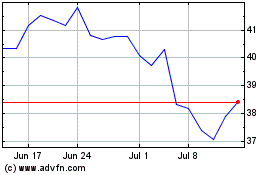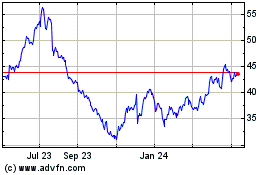Delta Air Lines to Leave Airline Trade Group
October 27 2015 - 6:20PM
Dow Jones News
Delta Air Lines Inc. said Tuesday it intends to pull out of
Airlines for America, the leading U.S. carrier trade association,
in April. The move, which will save Delta $5 million in annual
dues, will free up the carrier to find "a more efficient way of
communicating in Washington" on issues important to Delta, its
customers and employees, the company said in a statement.
Airlines for America said the move wasn't unexpected because
Delta "has not been aligned with other… members on a few key
industry positions, including the need to modernize and improve the
nation's air-traffic control system," said association CEO Nick
Calio.
Delta's departure will reduce the trade group's airline
membership to nine big airlines, including three cargo carriers.
Left among the passenger airlines will be American Airlines Group
Inc., United Continental Holdings Inc., Southwest Airlines Co.,
Alaska Air Group Inc., JetBlue Airlines Corp. and Hawaiian Holdings
Inc.'s Hawaiian Airlines. The loss of Delta, the third-largest
passenger carrier by traffic, could weaken the group's lobbying
efforts.
Doug Parker, CEO of American and the current chairman of the
trade association's board of directors, said the group has been and
will continue to be more effective as an industry advocate "with a
unified voice in Washington," Mr. Parker said in a statement. Other
issues the association is working on are fighting higher taxes on
airlines and unnecessary regulations, while pushing for updated
infrastructure and modernizing the nation's air-navigation
system.
Delta Chief Executive Richard Anderson, who served as chairman
of the trade association for the first two years of Mr. Calio's
tenure, recently stopped attending meetings of the group's board,
although other Delta employees still serve on number of trade group
councils and committees.
Mr. Anderson, chief of the Atlanta-based airline since 2007,
isn't shy about taking a contrarian view. Delta is the only leading
U.S. airline to pick a fight with the U.S. Export-Import Bank for
offering loan guarantees on Boeing Co. aircraft to well-heeled
foreign carriers. The export bank, whose mandate wasn't extended
earlier this year, currently is fighting for its life in the budget
battle playing out in Congress.
Mr. Anderson also lead the charge, later joined by American and
United, against three large Persian Gulf airlines. The three U.S.
carriers want the U.S. government to curtail the Gulf trio's access
to the U.S. on the grounds they are highly subsidized by their
government owners, assertions the Gulf carriers deny. The U.S.
position has led to conflict within the trade association, with
JetBlue, Alaska and the cargo carriers decrying what they fear is
protectionism on the part of the largest three members. The other
U.S. carriers also fear retaliation by the Gulf airlines, with whom
some of them have close ties.
And the Delta CEO has said numerous times this year that he
doesn't believe a privatization or corporatization of the nation's
air-traffic control system is a good idea. Many other U.S. airlines
think the government should take air-navigation activities out of
the Federal Aviation Administration and put it into a federal
corporation, a public-private partnership or a nonprofit company.
More than two dozen foreign countries have made that move.
U.S. advocates believe the FAA's big air-traffic-control
modernization program would roll out faster and surer under
privatized authority. Mr. Anderson has said he thinks the FAA is
doing a good job, and he recently assumed the leadership role of an
influential committee that advises the FAA on that modernization
effort.
Subscribe to WSJ: http://online.wsj.com?mod=djnwires
(END) Dow Jones Newswires
October 27, 2015 18:05 ET (22:05 GMT)
Copyright (c) 2015 Dow Jones & Company, Inc.
Alaska Air (NYSE:ALK)
Historical Stock Chart
From Mar 2024 to Apr 2024

Alaska Air (NYSE:ALK)
Historical Stock Chart
From Apr 2023 to Apr 2024
